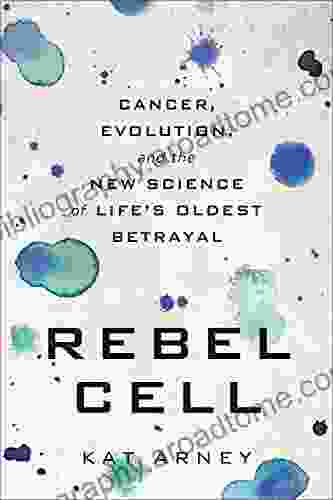Cancer Evolution: The New Science of Life's Oldest Betrayal

4.6 out of 5
| Language | : | English |
| File size | : | 1345 KB |
| Text-to-Speech | : | Enabled |
| Screen Reader | : | Supported |
| Enhanced typesetting | : | Enabled |
| X-Ray | : | Enabled |
| Word Wise | : | Enabled |
| Print length | : | 416 pages |
Cancer is a disease that has plagued humanity for centuries. It is the leading cause of death worldwide, and it is estimated that one in three people will develop cancer in their lifetime.
For a long time, cancer was thought to be a simple disease caused by a single mutation. However, we now know that cancer is a complex disease that is caused by a variety of factors, including genetics, environment, and lifestyle.
One of the most important factors in cancer development is evolution. Cancer cells are able to evolve and adapt to their environment, which makes them difficult to treat.
In recent years, there has been a growing interest in the role of evolution in cancer development. This research has led to a new understanding of cancer and has helped to develop new treatments.
In his book Cancer Evolution: The New Science of Life's Oldest Betrayal, Dr. Robert Weinberg explores the role of evolution in cancer development. Weinberg argues that cancer is not a new disease, but rather a disease that has been with us for millions of years.
Weinberg's book is a fascinating and thought-provoking look at the evolution of cancer. It is a must-read for anyone who is interested in cancer research or who wants to learn more about the human body.
The Evolution of Cancer
Cancer is a disease that is characterized by the uncontrolled growth of cells. This growth can occur in any part of the body, and it can lead to a variety of symptoms, including pain, swelling, and fatigue.
Cancer cells are able to evolve and adapt to their environment, which makes them difficult to treat. This evolution is driven by a process called natural selection. Natural selection is a process by which organisms that are better adapted to their environment are more likely to survive and reproduce.
In the case of cancer, cells that are able to grow and divide more quickly are more likely to survive and reproduce. This leads to the development of cancer cells that are more aggressive and difficult to treat.
The New Science of Cancer Treatment
The new science of cancer treatment is based on the understanding that cancer is a disease that is driven by evolution. This understanding has led to the development of new treatments that are designed to target the evolutionary process of cancer.
One of the most promising new cancer treatments is immunotherapy. Immunotherapy is a type of treatment that uses the body's own immune system to fight cancer. Immunotherapy drugs work by blocking the checkpoints that normally prevent the immune system from attacking cancer cells.
Immunotherapy has shown great promise in the treatment of a variety of cancers, including melanoma, lung cancer, and bladder cancer. However, immunotherapy is still a relatively new treatment, and there is still much that we do not know about it.
The Future of Cancer Treatment
The future of cancer treatment is bright. The new science of cancer evolution is leading to the development of new and more effective treatments. These treatments are based on a deep understanding of the biology of cancer, and they are designed to target the evolutionary process of cancer.
With the continued development of new treatments, we are moving closer to a day when cancer is no longer a life-threatening disease. However, there is still much work to be done, and we need to continue to invest in cancer research.
4.6 out of 5
| Language | : | English |
| File size | : | 1345 KB |
| Text-to-Speech | : | Enabled |
| Screen Reader | : | Supported |
| Enhanced typesetting | : | Enabled |
| X-Ray | : | Enabled |
| Word Wise | : | Enabled |
| Print length | : | 416 pages |
Do you want to contribute by writing guest posts on this blog?
Please contact us and send us a resume of previous articles that you have written.
 Book
Book Novel
Novel Page
Page Chapter
Chapter Text
Text Story
Story Genre
Genre Reader
Reader Library
Library Paperback
Paperback E-book
E-book Magazine
Magazine Newspaper
Newspaper Paragraph
Paragraph Sentence
Sentence Bookmark
Bookmark Shelf
Shelf Glossary
Glossary Bibliography
Bibliography Foreword
Foreword Preface
Preface Synopsis
Synopsis Annotation
Annotation Footnote
Footnote Manuscript
Manuscript Scroll
Scroll Codex
Codex Tome
Tome Bestseller
Bestseller Classics
Classics Library card
Library card Narrative
Narrative Biography
Biography Autobiography
Autobiography Memoir
Memoir Reference
Reference Encyclopedia
Encyclopedia Foxes Publishing
Foxes Publishing Lucia Canovi
Lucia Canovi Francesc Zamora
Francesc Zamora Eric Stein
Eric Stein Steve Wilkins
Steve Wilkins Esther Yang
Esther Yang Francesca Favuzzi
Francesca Favuzzi Patricia H Thornton
Patricia H Thornton Ellen Zachos
Ellen Zachos Leigh Tate
Leigh Tate Lauren Knatz
Lauren Knatz Faith Ringgold
Faith Ringgold Mary Wingo
Mary Wingo Elsa Joseph
Elsa Joseph Jeff Alexander
Jeff Alexander Ernie Mann
Ernie Mann Erik Dunton
Erik Dunton Felixia Wade
Felixia Wade Eric Deen
Eric Deen Jean Kerr
Jean Kerr
Light bulbAdvertise smarter! Our strategic ad space ensures maximum exposure. Reserve your spot today!

 Arthur Conan Doyle144 Names, Sigils, and Stewardships to Call the Magickal Angels of Celestine...
Arthur Conan Doyle144 Names, Sigils, and Stewardships to Call the Magickal Angels of Celestine... Frank MitchellFollow ·3.9k
Frank MitchellFollow ·3.9k Harry HayesFollow ·12k
Harry HayesFollow ·12k Dean ButlerFollow ·12k
Dean ButlerFollow ·12k Felix HayesFollow ·4.4k
Felix HayesFollow ·4.4k Rex HayesFollow ·2.7k
Rex HayesFollow ·2.7k Jon ReedFollow ·12.1k
Jon ReedFollow ·12.1k Colin FosterFollow ·10k
Colin FosterFollow ·10k James GrayFollow ·16.3k
James GrayFollow ·16.3k

 Troy Simmons
Troy SimmonsStories From The Life Of Baha: A Must-Read For Spiritual...
Discover the Inspiring Teachings and Enriching...

 Wesley Reed
Wesley ReedDuke Review of MRI Principles: Case Review - Your Gateway...
Unveiling the Essence...

 Ralph Waldo Emerson
Ralph Waldo EmersonThe Big Book of NFTs: Your Ultimate Guide to the Digital...
In the rapidly evolving world of digital...

 Jason Hayes
Jason HayesUnveiling the Labyrinth: The Cheat Sheet Novel and its...
In the realm...
4.6 out of 5
| Language | : | English |
| File size | : | 1345 KB |
| Text-to-Speech | : | Enabled |
| Screen Reader | : | Supported |
| Enhanced typesetting | : | Enabled |
| X-Ray | : | Enabled |
| Word Wise | : | Enabled |
| Print length | : | 416 pages |














